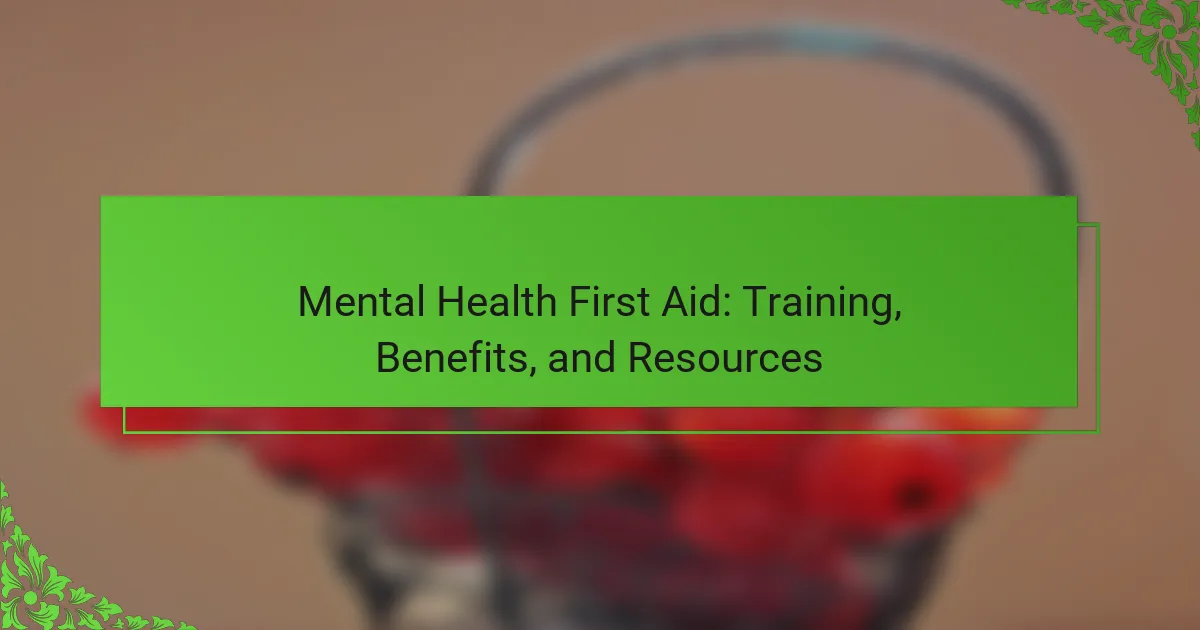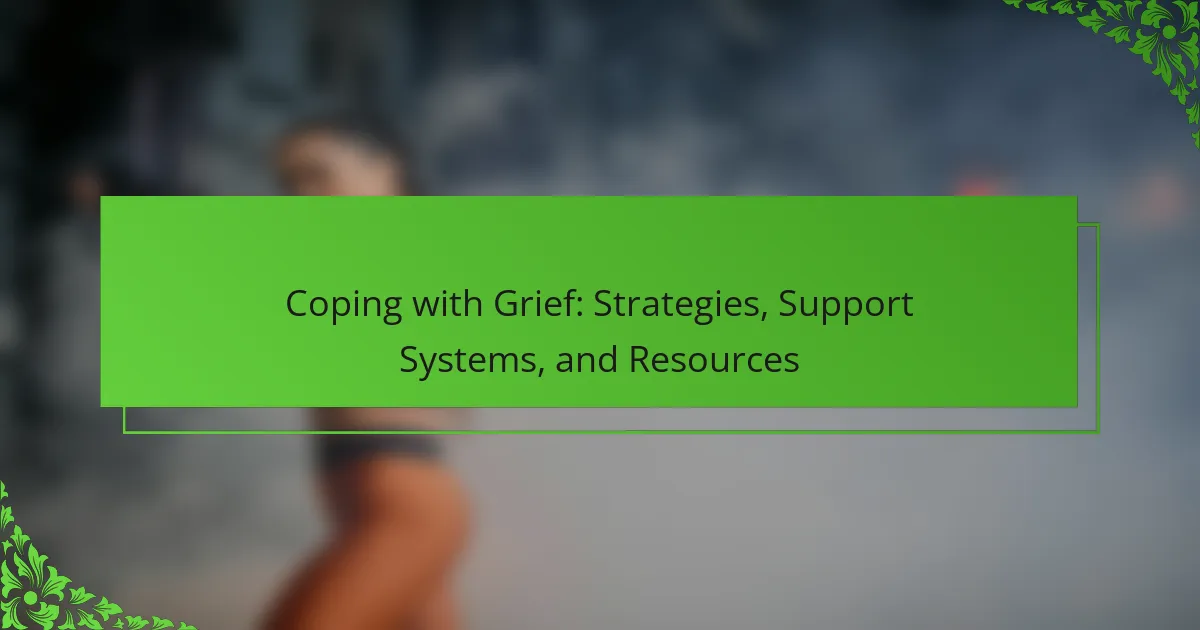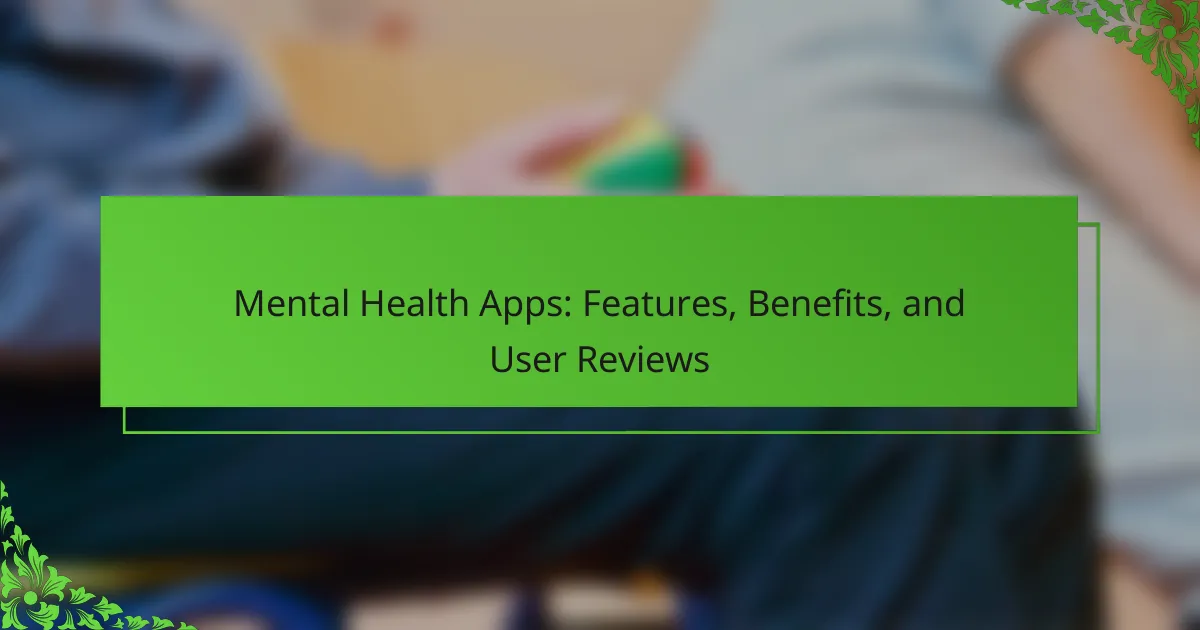Mental Health First Aid training equips individuals with vital skills to support those in mental health crises. This article explores the training process, highlights key benefits such as increased awareness and reduced stigma, and provides resources for accessing programs from organizations like the National Council for Behavioral Health and the Red Cross. Additionally, it discusses best practices for effective implementation and the challenges trainers face in diverse settings.
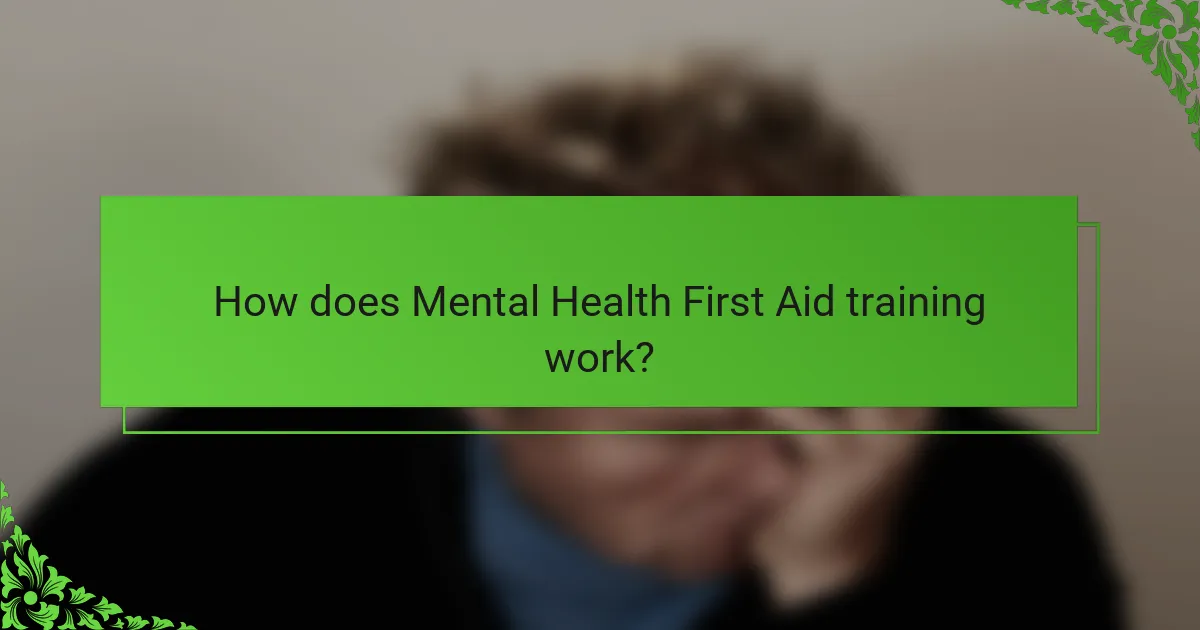
How does Mental Health First Aid training work?
Mental Health First Aid training equips individuals with skills to support someone experiencing a mental health crisis. The training typically involves a structured program that covers key topics such as recognizing signs of mental health issues, providing initial help, and guiding individuals towards professional support.
Participants engage in interactive learning through role-playing and group discussions, enhancing their ability to respond effectively. The training can vary in duration, often spanning 8 to 12 hours, and is available in both in-person and online formats.
Research indicates that Mental Health First Aid training improves participants’ confidence and knowledge in dealing with mental health issues, promoting a supportive community environment. This training is crucial for educators, healthcare providers, and community leaders, as it fosters mental health awareness and reduces stigma associated with mental illness.
What are the key components of Mental Health First Aid training?
Mental Health First Aid training includes key components such as understanding mental health issues, recognizing signs and symptoms, providing initial support, and connecting individuals to appropriate resources. The training emphasizes practical skills and strategies to assist those in need. Additionally, it fosters empathy and enhances community awareness.
Who can benefit from Mental Health First Aid training?
Individuals in various roles can benefit from Mental Health First Aid training, including educators, healthcare professionals, and community leaders. This training equips them with skills to identify and respond to mental health crises effectively. For example, teachers can support students facing emotional challenges, while workplace leaders can foster a supportive environment. As a result, Mental Health First Aid enhances overall community well-being and resilience.

What are the benefits of Mental Health First Aid?
Mental Health First Aid provides essential skills to support individuals experiencing mental health challenges. Key benefits include increased awareness of mental health issues, reduced stigma, improved confidence in providing help, and enhanced community support networks. Training equips participants to recognize signs of mental distress and respond effectively. As a result, this proactive approach can lead to better outcomes for individuals in crisis.
How does Mental Health First Aid improve community well-being?
Mental Health First Aid enhances community well-being by equipping individuals with skills to support those experiencing mental health challenges. This training fosters understanding, reduces stigma, and promotes early intervention, leading to improved mental health outcomes. Communities benefit from increased awareness and a supportive environment, which can decrease the prevalence of mental health crises. Studies show that trained individuals are more likely to provide effective assistance, facilitating access to professional help.
What impact does Mental Health First Aid have on workplaces?
Mental Health First Aid significantly improves workplace environments by enhancing employee support and reducing stigma. It equips staff with skills to recognize and address mental health issues, fostering a culture of openness. As a result, organizations report increased employee well-being and productivity. Training leads to better communication, which enhances team dynamics and morale. Statistics show that workplaces implementing Mental Health First Aid experience a 30% reduction in absenteeism and a 25% increase in employee satisfaction.
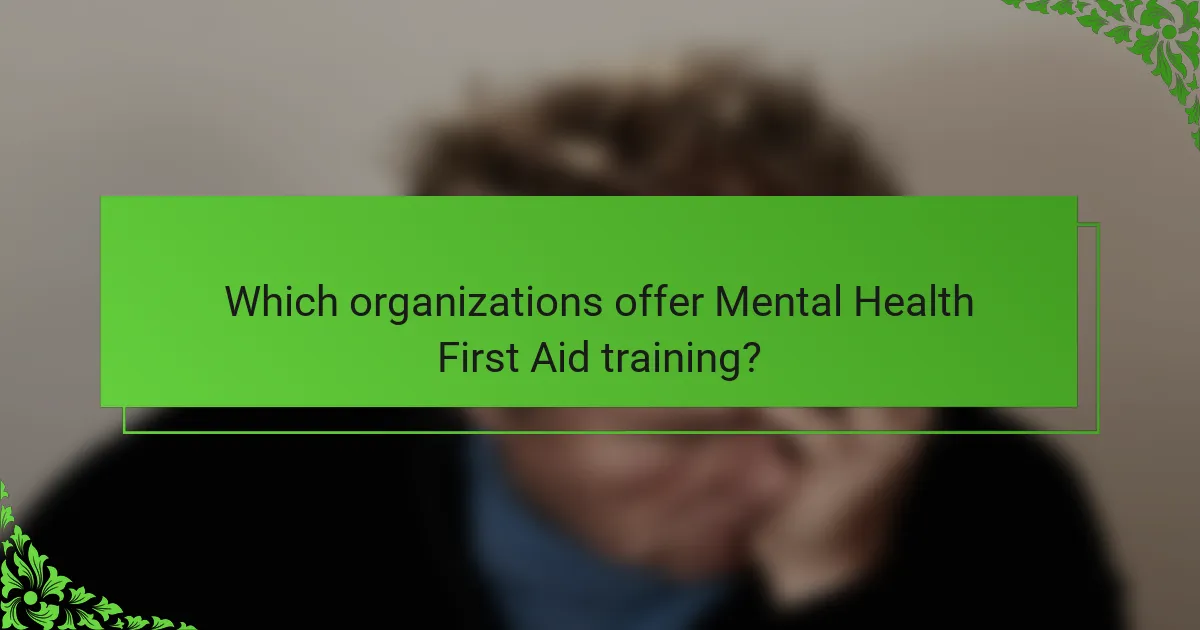
Which organizations offer Mental Health First Aid training?
Several organizations offer Mental Health First Aid training, including the National Council for Behavioral Health, Mental Health First Aid USA, and the Red Cross. These organizations provide comprehensive programs designed to equip individuals with the skills to assist someone experiencing a mental health crisis. Training typically covers topics such as recognizing signs of mental health issues and providing initial support.
How do local and national organizations differ in their training approaches?
Local organizations often focus on community-specific needs in their Mental Health First Aid training, while national organizations emphasize standardized approaches. Local training may incorporate cultural nuances and specific regional challenges, enhancing relevance. National training typically provides a uniform curriculum, ensuring consistency across various locations. This difference highlights unique attributes in training delivery, adapting to local contexts versus maintaining broad applicability.
What resources are available for Mental Health First Aid trainers?
Mental Health First Aid trainers have access to various resources to enhance their training effectiveness. These include comprehensive training manuals, online modules, certification programs, and community support networks. Additionally, trainers can utilize multimedia tools such as videos and interactive workshops to engage participants. Access to ongoing professional development and updated research on mental health trends further supports trainers in delivering relevant content.
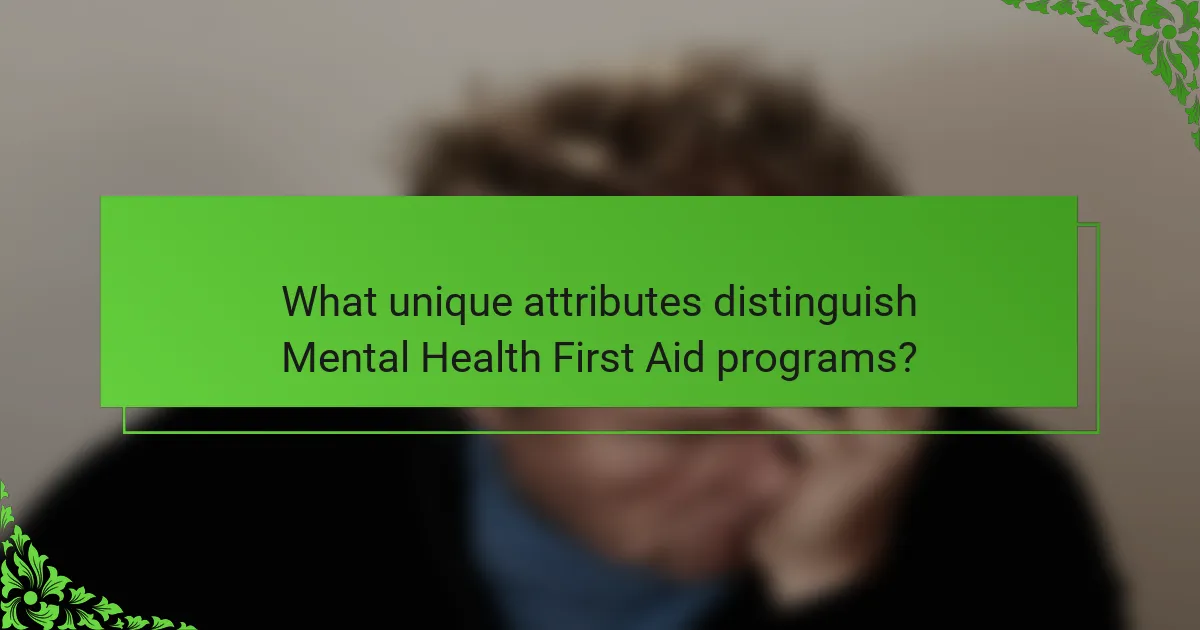
What unique attributes distinguish Mental Health First Aid programs?
Mental Health First Aid programs are distinguished by their emphasis on practical skills, community engagement, and accessibility. These programs train individuals to recognize and respond to mental health crises effectively. Key unique attributes include a focus on peer support, the integration of local resources, and culturally sensitive approaches tailored to diverse populations. Additionally, the programs often feature ongoing support networks for participants, enhancing their long-term impact in promoting mental well-being.
How do different countries adapt Mental Health First Aid to local needs?
Countries adapt Mental Health First Aid to local needs by tailoring training programs, resources, and cultural approaches. For example, Australia emphasizes community engagement, while the UK focuses on workplace mental health. Each country’s adaptation reflects unique attributes like societal attitudes and available support systems. As a result, these programs enhance accessibility and effectiveness, ensuring they meet specific regional challenges.
What innovative formats are emerging in Mental Health First Aid training?
Innovative formats in Mental Health First Aid training include virtual reality simulations, mobile applications, and interactive online courses. These formats enhance engagement and accessibility, catering to diverse learning preferences. For example, virtual reality can immerse participants in real-life scenarios, improving practical skills. Mobile apps provide on-the-go resources, while online courses allow flexible learning schedules.
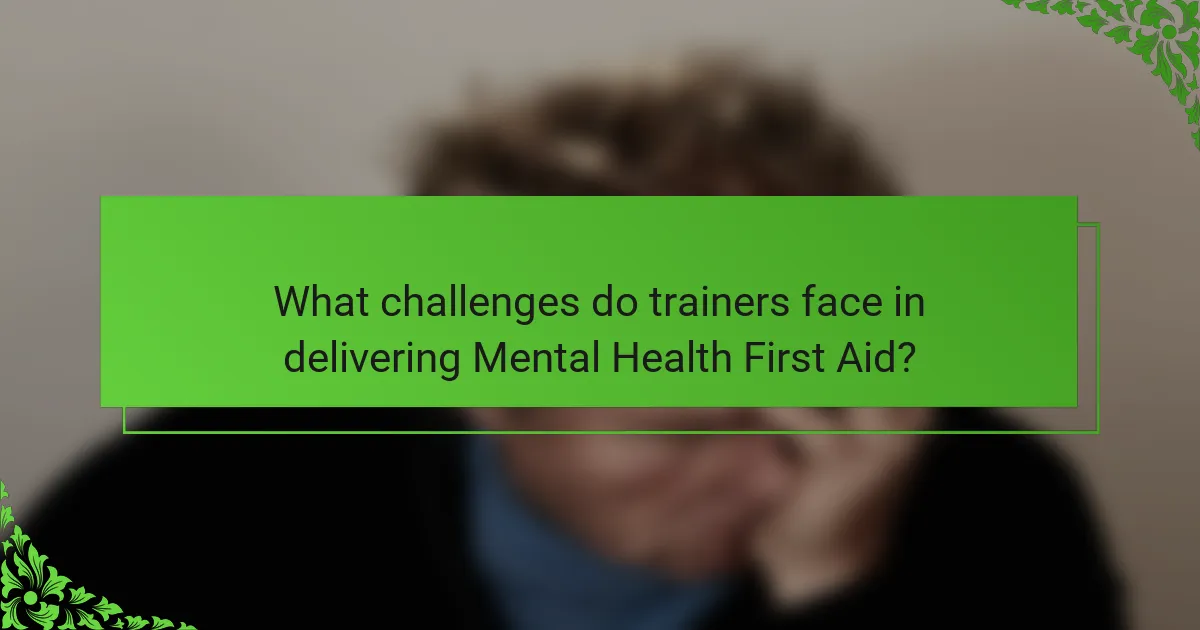
What challenges do trainers face in delivering Mental Health First Aid?
Trainers face several challenges in delivering Mental Health First Aid, including varying participant engagement levels, stigma surrounding mental health, and limited resources. Additionally, trainers may encounter difficulties in tailoring content to diverse audiences and addressing sensitive topics effectively. These factors can hinder the overall effectiveness of the training program.
How can trainers effectively engage participants in Mental Health First Aid?
Trainers can effectively engage participants in Mental Health First Aid by utilizing interactive activities and real-life scenarios. Incorporating role-playing exercises fosters empathy and practical understanding. Regular feedback and open discussions enhance participant involvement and retention of information. Engaging materials, such as videos and case studies, further stimulate interest and learning.
What common misconceptions exist about Mental Health First Aid?
Many misconceptions about Mental Health First Aid include the belief that it is only for professionals or that it can replace therapy. Mental Health First Aid is designed for anyone to learn basic skills to support someone in distress. It does not provide treatment but equips individuals with the knowledge to guide others towards appropriate help. Another common misconception is that it solely focuses on severe mental illnesses; in reality, it addresses a wide range of mental health challenges, including stress and anxiety. Additionally, some believe that training is too complex; however, the program is structured to be accessible and practical for all participants.
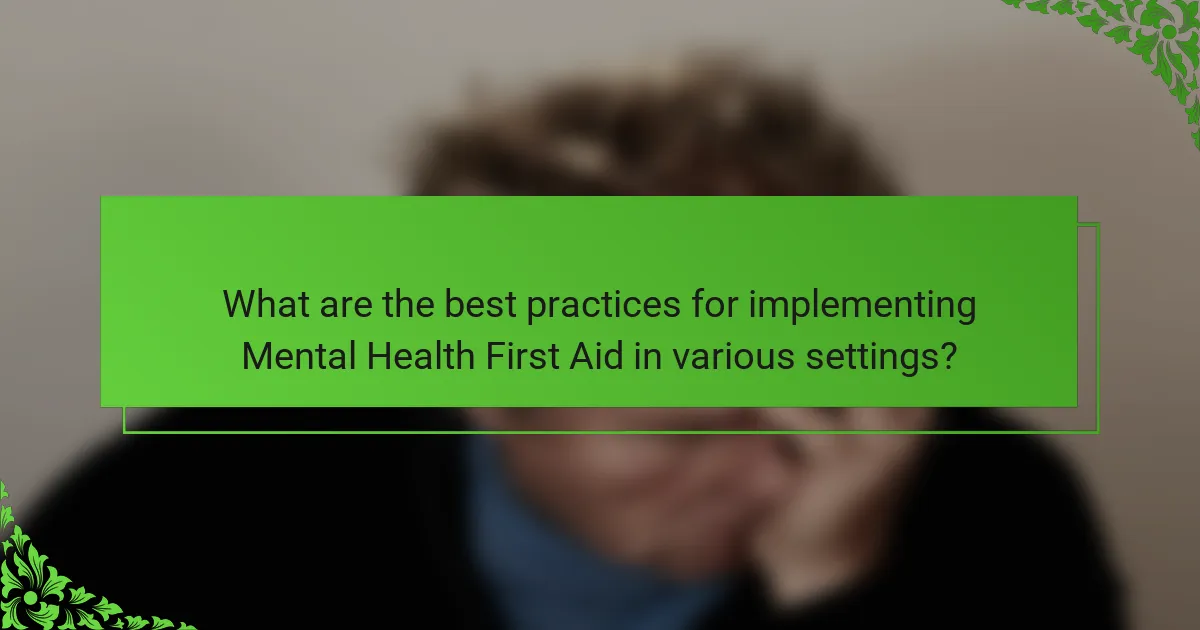
What are the best practices for implementing Mental Health First Aid in various settings?
Implementing Mental Health First Aid effectively requires tailored approaches for different settings. Key best practices include training staff comprehensively, promoting awareness, and creating supportive environments.
1. Conduct regular training sessions to ensure all staff members are equipped with mental health first aid skills.
2. Foster an open dialogue about mental health to reduce stigma and encourage individuals to seek help.
3. Integrate mental health resources into workplace policies and practices to ensure accessibility.
4. Create a support network within the organization to provide ongoing assistance and resources.
5. Evaluate the effectiveness of mental health initiatives through feedback and adjust programs accordingly.
How can organizations encourage participation in Mental Health First Aid training?
Organizations can encourage participation in Mental Health First Aid training by promoting its benefits and creating a supportive culture. Highlighting the training’s potential to improve mental health awareness and reduce stigma motivates employees. Providing incentives, such as professional development credits or recognition, can further increase engagement. Additionally, scheduling sessions during work hours and ensuring accessibility can enhance participation rates. Regularly sharing success stories from past participants reinforces the value of the training.
What strategies can improve retention of Mental Health First Aid knowledge?
Active learning techniques, regular practice, and peer discussions can significantly improve retention of Mental Health First Aid knowledge. Incorporating role-playing scenarios enhances practical understanding.
Reinforcing training with refresher courses every few months helps maintain knowledge. Utilizing digital resources, such as apps or online forums, offers ongoing support and engagement.
Creating a supportive community fosters sharing experiences and insights, which reinforces learning. Engaging in real-life applications allows individuals to better internalize concepts and skills.
What common mistakes should be avoided when conducting Mental Health First Aid training?
To avoid common mistakes in Mental Health First Aid training, focus on clarity, engagement, and accurate information. Key mistakes include neglecting to tailor the training to the audience’s needs, failing to provide practical scenarios for application, and not emphasizing the importance of self-care for trainers and participants. Additionally, overlooking the need for ongoing support and resources post-training can diminish the effectiveness of the program. Ensuring a supportive learning environment enhances retention and application of skills.
